George Kuntz — A Pathway for Success from Club To College Soccer
Liverpool International Academy in SoCal is focused on providing their players with the best possible resources and has recently expanded its staff, welcoming George Kuntz on board to help guide players on the college process and mentor coaches. With a holistic and tactical approach, Kuntz will look to add to the development team of coaches and help players reach for their dreams.
The transition from youth soccer to the collegiate game is perhaps the biggest and most challenging part of the journey for many players … and a time in which expert guidance can make the world of difference.
George Kuntz is in his sixth season as the Men’s Soccer head coach at Cal State Fullerton. When Kuntz took over the Fullerton squad in 2013, he already had decades of experience in the world of coaching — including nineteen-years as Head Coach at UCI Men’s Soccer and a ten-year stint at US Youth Soccer’s Cal South as the Director of Coaching where he established mandatory licensing and a coaching education program.
With an eye for talent, both in players as well as for top coaches, Kuntz has worked with many of America’s best. With an outstanding record of significant achievements — along with the highest average of wins per season in the NCAA’s Big West Conference, Kuntz is most proud of his work in coaching education and player development.
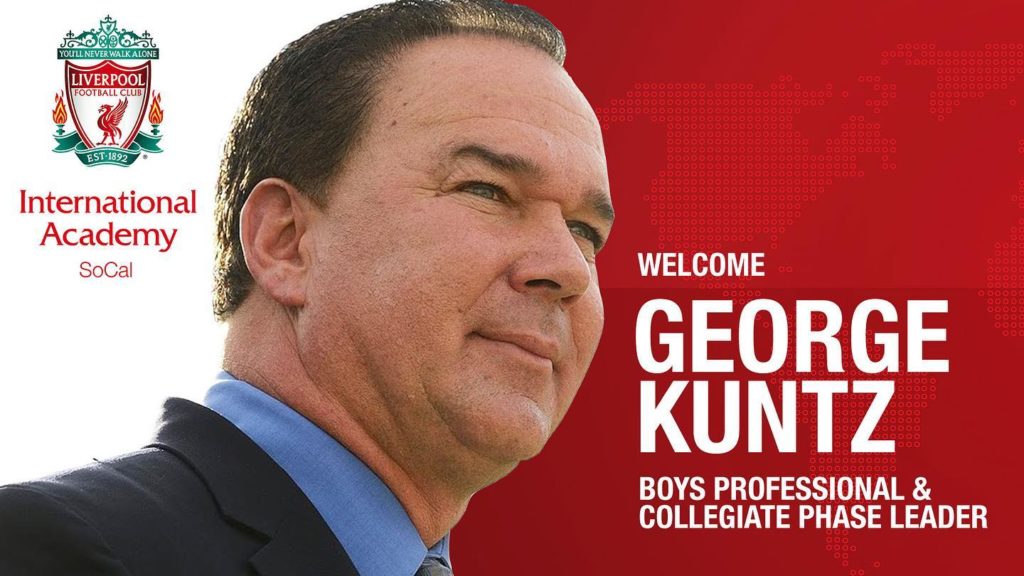
Born into a life of soccer with a father who played professionally in Mexico — Kuntz claims he was raised in a technical training environment. Hardwired to help grow the game, Kunts has an innate sense of how to help players reach their peak performance and is proud to join the Liverpool International Academy in SoCal as the Boys Professional/Collegiate Phase Leader.
George Kuntz will be a great mentor and resource for our coaches, our players and our families.
Tim Woodcock, CEO Liverpool FC International Academy SoCal
Tim Woodcock, CEO Liverpool FC International Academy SoCal says, “I’m really excited to have George join our program. He is well known in our community for developing players and winning teams for the last 30 years. We look forward to learning from his massive experience, knowledge, and guidance.”
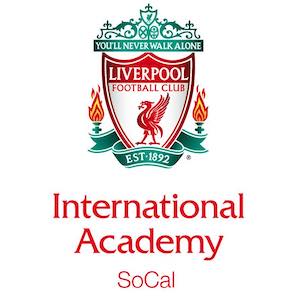
SoccerToday Interview with George Kuntz
Diane Scavuzzo: You have joined the Liverpool International Academy in SoCal as the Boys Professional/Collegiate Phase Leader.
George Kuntz: Yes, and I am very excited. I always want to help kids and I like being involved with a local club — involved in a way where I can help a multitude of teams, gearing players towards college life. Or, if a player wants to go further than collegiate soccer, get them in that professional training mode.
Tim Woodcock, the CEO of the Liverpool FC International Academy SoCal, and I have talked for quite a while and late last year we made a decision that I would basically mentor coaches with the club and work with players in the older age groups to help guide them along their journey.
Diane Scavuzzo: That’s wonderful.
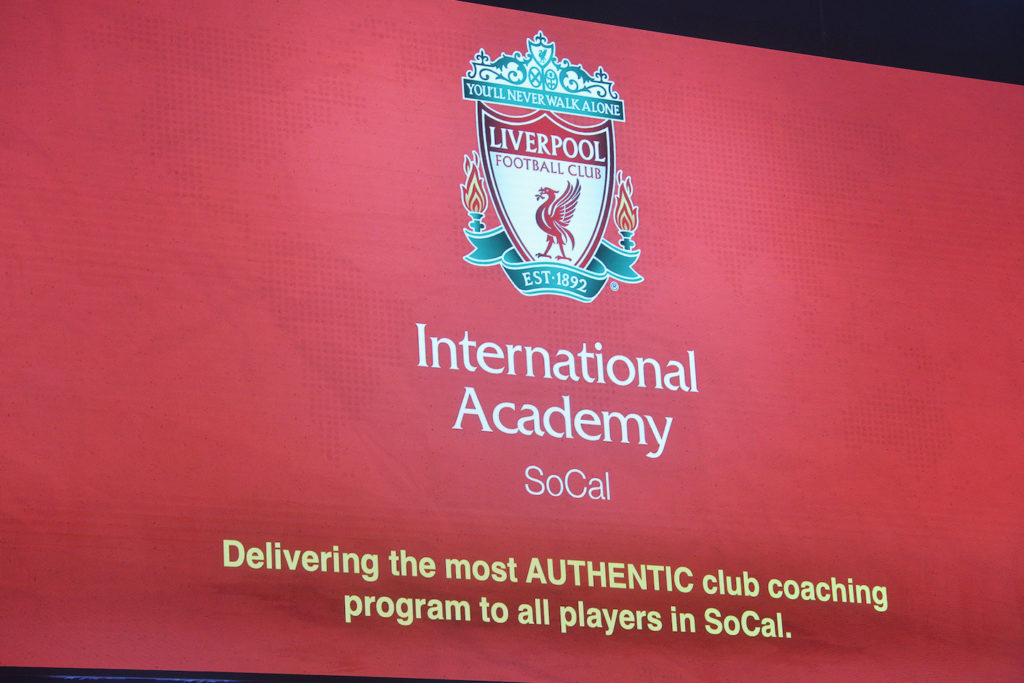
George Kuntz: I’m excited to work with Tim and the Liverpool FC International Academy SoCal.
Tim has a great following and is very forward-thinking.
There are very few youth clubs as well organized as his. He’s a pretty sharp cookie.
Diane Scavuzzo: What advice can you share with college-bound players?
George Kuntz: A player needs to speak with his or her coach and have a really honest discussion, asking where, and at what level college they could play.
No one can say with absolute certainty that a player belongs in Division 1, Division 2 or Division 3, but the person who has worked the most with the player has a very good idea of what collegiate level he or she should play.
Some coaches might say, “You’re not ready for Stanford,” or “I’ve seen Stanford play, I don’t know that you’re quite ready for Stanford.”
A coach also might know if a college team has a right-back that’s on the U20 National Team. It could be very hard to replace that level of player to earn significant playing time.
It is important for players to have an honest, candid and upfront talk with their coach.
Then it is critical to match the player with the college’s style of play.
Players should go watch college games and see what matches are streamed and then they can say, “I can play as well as that center back,” or, “I can score goals like that forward.”
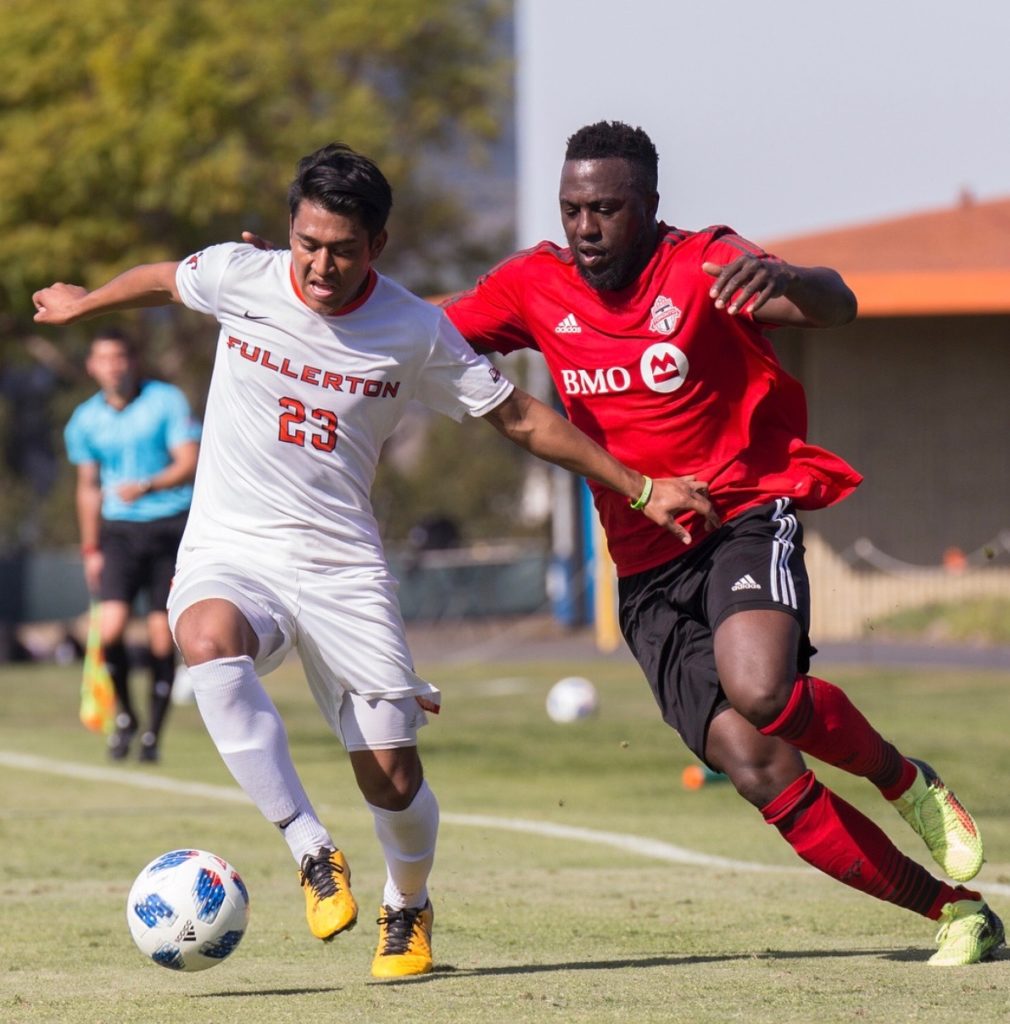
If a player wants to play college soccer, it is important that they know what they are up against.
Think about it, you’re playing against guys that are four or five years older than you and that’s who you’re competing with for time on the field. You will be dealing with men that could be in their early twenties with a couple of years of experience in the college game.
So players need to be aware of the level of physicality, the technical speed, the tactical speed, the decision making, the speed of thought, the speed of play, and of course the technical speed of collegiate soccer.
The powerfulness, the strength of speed, the explosiveness of these players at the next level is different from anything you can deal with at the youth level.
So, I look forard to getting our Liverpool International Academy players ready for their college journey.
At Fullerton, I am also always looking for great opportunities for my players. Recently, we played San Diego Loyal and we have played the Colorado Rapids as well as Atlanta United when they trained at our school. We try to play as many pro teams as we can because it provides an invaluable experience for our players.
Great result against a @MLS club! @Pinzonnnnnn scores in the second half to tie the @ColoradoRapids 👏👏 #TusksUp pic.twitter.com/0EgPU2pVJS
— Titans Men’s Soccer (@FullertonMSOC) January 29, 2020
Diane Scavuzzo: What are your top three recommendations for players who want to play college soccer?
George Kuntz: First, have an honest discussion with the youth coach. Second, know what you’re up against by watching college teams play. And, the third is to get prepared.
A college-bound player needs to be prepared technically, mentally, and physically.
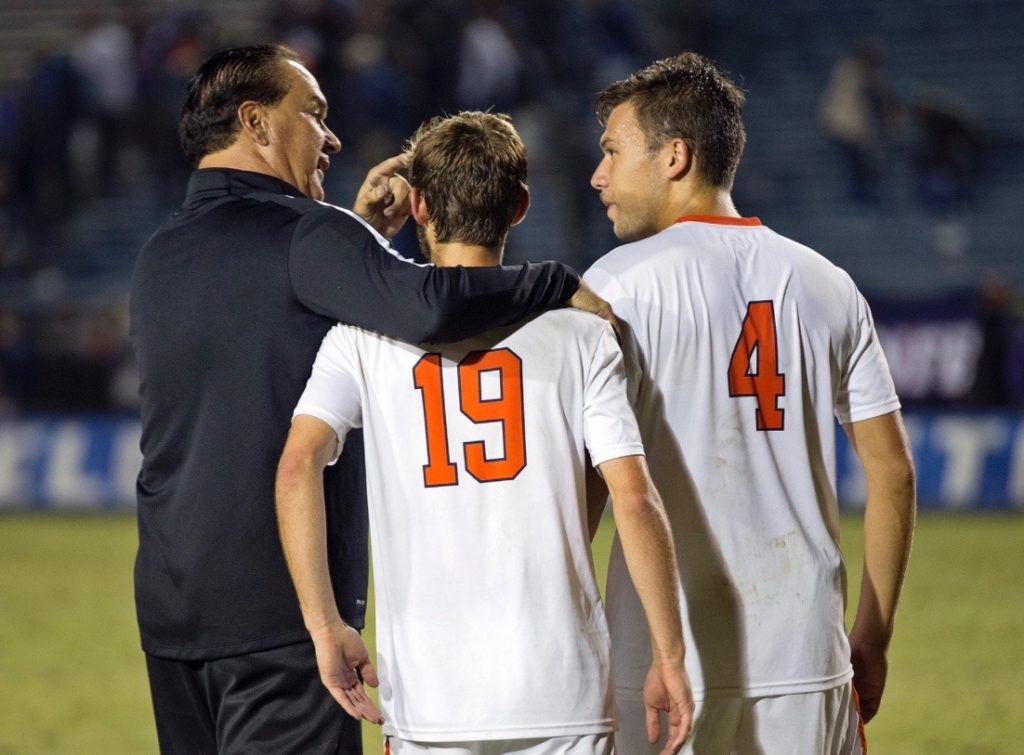
If you go into college thinking that you’re going to play at the school and you don’t have a plan B, you’re in trouble. And, the same thing with the pro game.
For example, in Division 1 soccer, those coaches are to graduate the student-athletes but they’ve also got a win. It’s a fine balancing act.
Players should understand the coach’s mentality. A college coach can have a wife, kids, a house — they have the responsibilities and they have a job to do.
Read: GUS CASTANEDA JOINS LIVERPOOL ACADEMY SO CAL
They’ve got to put a team on the field representing the school, the student body and the hundreds of thousands who have graduated. So they’ve got to produce.
College soccer is really about what have you done for me lately.
And if a young player doesn’t understand this and think, “Oh, I just want to play, I don’t care if I don’t get any money. I just want to be on the team” — it is naive.
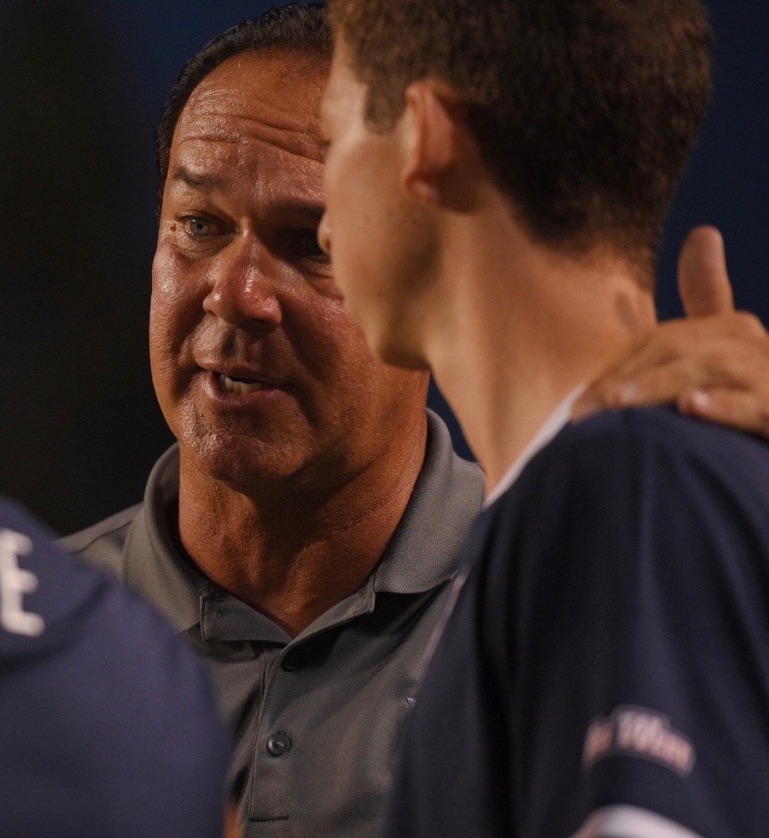
The coach isn’t thinking that way.
The coach is saying, “If he cannot impact us now or in the immediate future, we can’t use him,” because he’s getting 40 to 100 emails every day from all over the world.
Diane Scavuzzo: How does a coach deal with that many requests to consider players?
George Kuntz: How do you filter through that? We can’t. You don’t. There’s no way we can. So, coaches have an idea of what they want, how they want to play, type of players.
Diane Scavuzzo: Is that one of the reasons why it is so important to watch college teams play and see what type of soccer that play?
George Kuntz: Yes, by seeing college play, a player can understand, “This team’s very direct. I’m 5’1″ and if I played there, I’m not going to see the ball.”
Knowing the type of style a college team plays can help a youth player immensely.
Or perhaps they will see a teach play and realize, “This team plays very much a South American style of soccer — a style that’s possession-oriented on the ground.” Then they could realize they could fit into that style very well and say, “That’s the kind of coach I want to play for or that’s the kind of team I want to play on.”
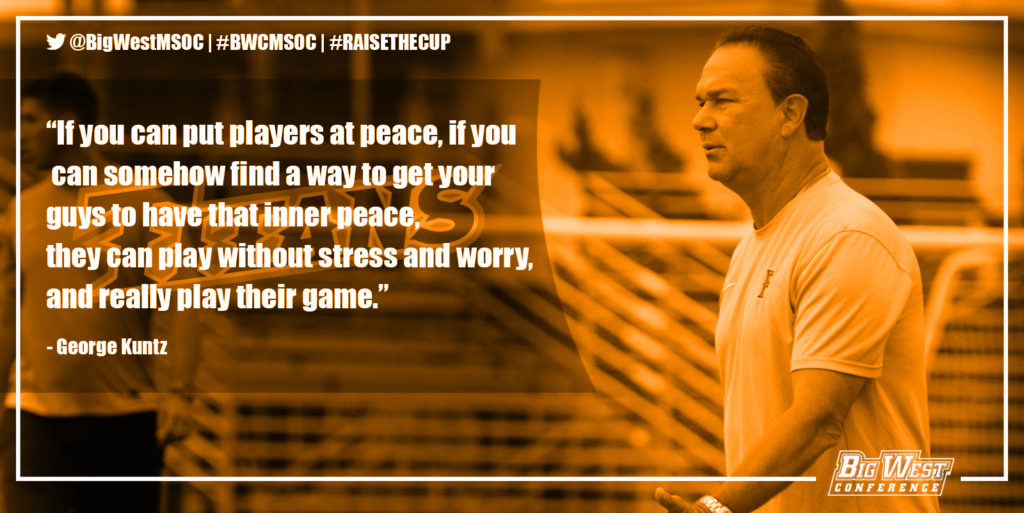
Diane Scavuzzo: Any advice to seniors still looking for a roster spot on a college team?
George Kuntz: If there’s not a college coach pounding down your door right now as a senior, then you better look at all your options because most of the players have already been identified.
And, if a player doesn’t think they’ve been identified through the scouting, then their coach needs to be their biggest advocate.
Their coach needs to call, not their parents, not the player.
Their coach needs to call college coaches that they may know, at the level that the player feels that the player can play in, and be the advocate for them. The club coach should call and say, “Can you please take a look at this kid? Here’s the short video, or here’s where he’s going to be playing. Or please take my word on it. I’ll put my stamp on it.” If the youth coach ever misled a collegiate coach, it would ruin their reputation.
College coaches are looking for players who are difference-makers.
Coaches want players who are going to help them immediately and can impact the game in different ways.
Does the player have special talents? Are they good in the air? Are they extremely explosive speed-wise? Are they pure goals scorer? Are they free-kick specialists? Do they have a long throw? Are they great at corner kicks? Basically, what else can the player add to the team that the coach cannot find any day of the week on any field?
Those are the things the coaches are looking for.
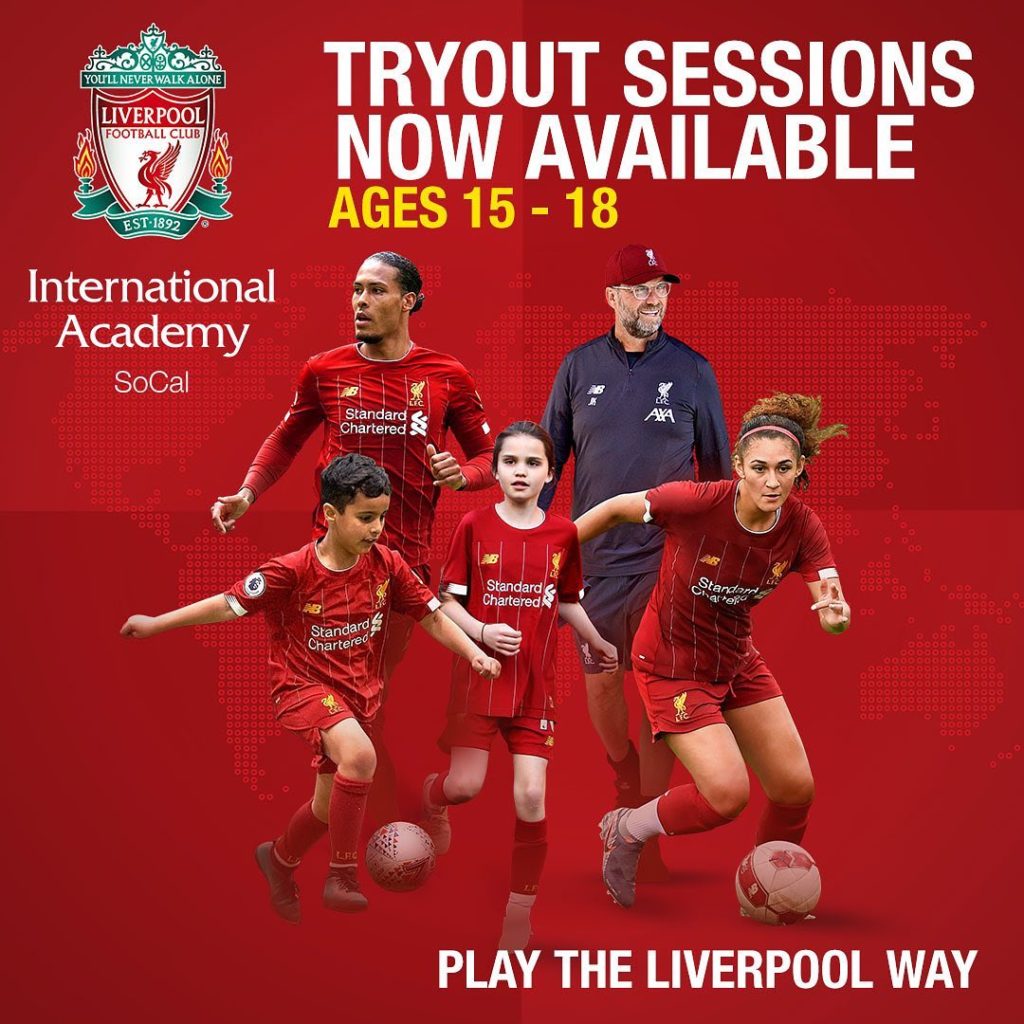
Read more on George Kuntz on the Liverpool International Academy in SoCal’s website
Read: GUS CASTANEDA JOINS LIVERPOOL ACADEMY SO CAL and PAUL HOLOHAN JOINS LIVERPOOL ACADEMY SOCAL TO BUILD ACADEMY





